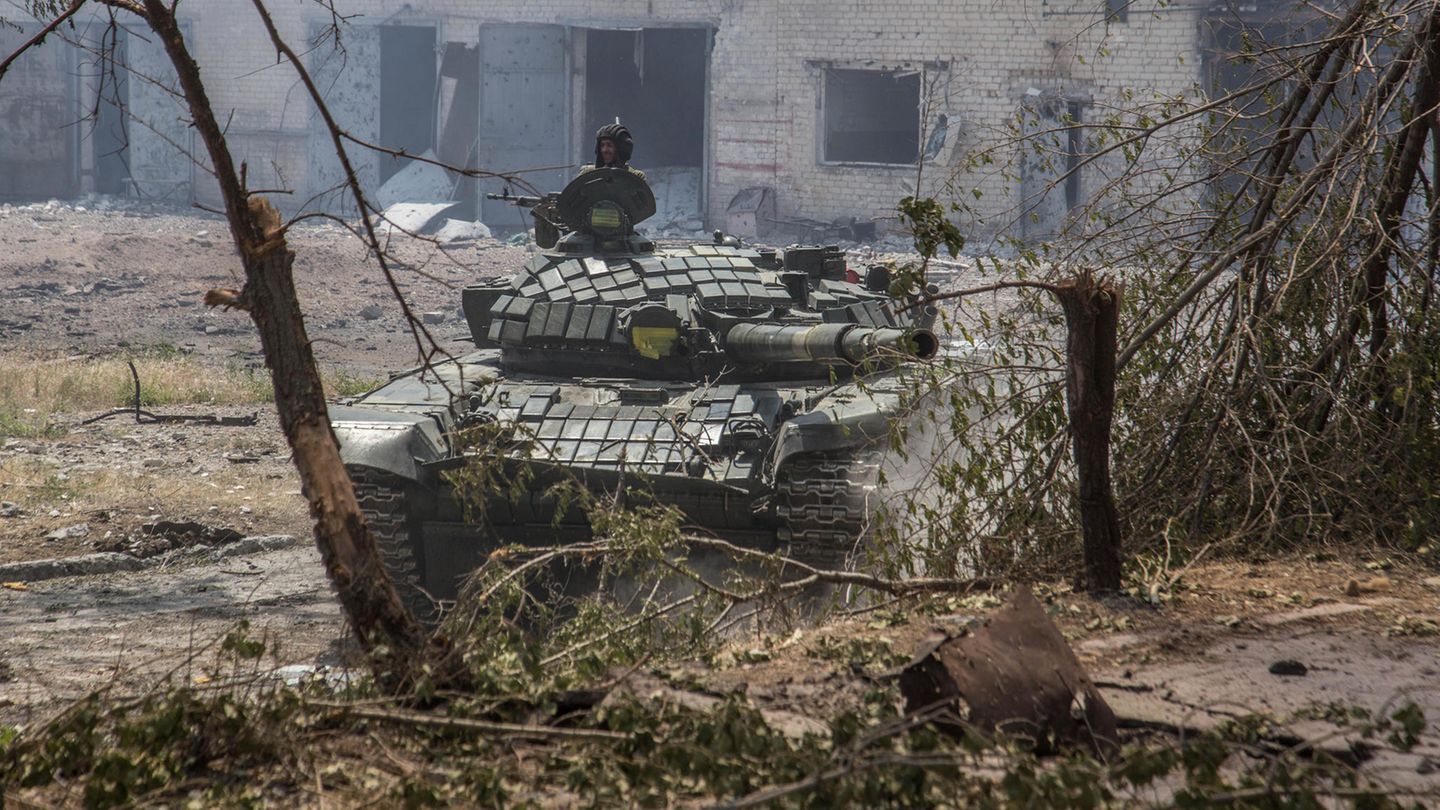Selenskyj warns of even more violent Russian attacks in Ukraine +++ Military experts: Moscow’s artillery strength insufficient for offensive +++ Von der Leyen firmly counts on EU candidate status for Ukraine +++ The news about Russia’s war in Ukraine in the star-Ticker.
Day 117 of the Ukraine War: The fighting for the administrative center of Sievjerodonetsk in eastern Ukraine continues with undiminished intensity. Russia has increased the use of artillery and deployed more attack troops to revive the offensive in the Donbass, said Ukrainian President Volodymyr Zelenskyy on Monday night. But the Ukrainian defenders held all contested points such as Sievjerodonetsk, Lyssychansk or Avdiivka.
Selenskyj spoke of difficult but also historic days that the country was facing. “Tomorrow will be a truly historic week when we will hear the European Union’s response on Ukraine’s candidate status,” said Zelenskyy. Precisely because of this decision, Russia will “demonstratively step up its hostile actions,” targeting not only Ukraine but also other European countries, he warned.
The Russian military meanwhile speaks of a positive development of their own offensive. According to their own statements, the Russian troops took Metjolkine, a suburb of the former city, on Sunday.
10:56 a.m .: EU foreign ministers discuss candidate status for Ukraine
European Union foreign ministers have started discussions on the European Commission’s proposal to grant Ukraine and Moldova candidate status. “The EU is ready to take in neighbors who want to join,” said foreign policy chief Josep Borrell on the sidelines of the Luxembourg meeting. However, Austria ties its approval at the EU summit on Thursday and Friday to progress in the accession process of the Western Balkans.
“We must not give the impression that there is a two-tier society,” Austrian Foreign Minister Alexander Schallenberg warned in Luxembourg. His country expects “at the EU summit a clear signal to the east, but also to the south-east”. The impression should not be given that Ukraine and Moldova are “in the fast lane”.
9.41 a.m .: Ukraine admits the loss of a suburb of Sievjerodonetsk
The Ukrainian authorities have acknowledged the loss of the village of Metyolkine, south-east of the administrative center of Sieverodonetsk in the east of the country. “Control of Metyolkine near Sieverodonetsk has been lost,” said the military governor of the eastern Ukrainian region of Luhansk, Serhiy Hajday, on his Telegram channel. The Russian Ministry of Defense had already reported the capture of the town adjacent to Sievjerodonetsk on Sunday. At the time, the Ukrainian general staff was still talking about a partial Russian success.
Sieverodonetsk’s sister city, Lysychansk, on the west bank of the river also came under fire. The evacuation operations in the city for civilians were underway. According to Hajdaj, there are also tough battles over the suburbs of Toshkivka and Ustynivka.
9:17 a.m.: London – Weaknesses of the Russian Air Force decisive for the course of the war
According to British intelligence experts, Russia’s difficulties with its advance in Ukraine are also due to the weaknesses of its air force. It is very likely that these are one of the most important factors behind the very limited Russian successes, said an update from the British Ministry of Defense. So far, the air forces have tended to avoid risks in their maneuvers and have not been able to achieve air supremacy. This has increased the pressure on the Russian ground forces, which are now increasingly exhausted.
According to British estimates, the Russians have combat-capable aircraft, but are not properly trained for modern air force operations. For years, Russian air force training was said to have focused more on impressing high-ranking military officials than on training dynamic deployment scenarios for different troops.
7.27 a.m .: One injured in renewed shelling of the Russian border region
According to official information, a man was injured by artillery fire in the western Russian region of Bryansk on the border with Ukraine. “This morning the village of Susemka was shelled by Ukrainian forces,” said the governor of the Bryansk region, Alexander Bogomas, in his Telegram channel. One person was “harmed” and several “objects” were damaged. One single-family home and two apartment buildings were damaged. In addition, the power supply of the village was partially paralysed.
Russia, which launched a war of aggression against Ukraine in February, has been lamenting the shelling of its own border regions for weeks. In this context, Bogomas’ formulation is piquant. “The shelling was in retaliation,” but the source of the fire was quickly neutralized, the governor wrote. It follows that previously Ukraine was shelled from Russian territory.
6:14 am: Military experts – Moscow’s artillery strength insufficient for offensive
According to military experts, Russia’s artillery superiority is not enough to capture the administrative center of Sievarodonetsk in eastern Ukraine. “Russia’s concentrated artillery capability, coupled with arguably weakened infantry units, remains insufficient to make Russian advances in Sieverodonetsk,” read the latest analysis by the Institute for the Study of the War (ISW) on Sunday evening. Russian troops continued to fight for control of the city but made little progress on Sunday.
According to the experts, Russia is likely to continue trying to encircle the former city and to cut off supplies for the remaining Ukrainian forces, who are largely holed up in the Azot chemical plant. However, there is currently little progress on this project. In addition, Moscow is preparing an offensive on Sloviansk. The Slovjansk-Kramatorsk area is considered the center of the Ukrainian defense forces in the Donbass region.
According to the ISW, Moscow itself is hindering the success of its invasion by continuing to speak of a “special military operation” instead of a war. This prevents Russia from mobilizing to generate more forces. In addition, the Kremlin lacks the legal means to punish soldiers who refuse to be deployed.
3.38 a.m .: Selenskyj warns of even more violent Russian attacks in Ukraine
Ukrainian President Volodymyr Zelenskyy warns of even more violent Russian attacks in Ukraine. “Of course we expect Russia to increase its hostile activity this week,” said Zelenskyy in his evening video message on Sunday evening. He added: “We are preparing. We are ready.”
The fighting, meanwhile, continues with full intensity, especially in the eastern Ukrainian Donbass. Villages around the embattled city of Sieverodonetsk continue to be under intense Russian fire. Ukrainian forces said on Sunday they had pushed back the Russians around Sieverodonetsk. In a post on the online network Facebook, the Ukrainian army referred to a success in the Toshkivka area. However, according to Kyiv, Russian forces are “storming” in the direction of the village of Orikhove.
The Russian Defense Ministry said on Sunday it had launched rocket attacks at a meeting of senior Ukrainian military officials, killing “more than 50 generals and officers”. In addition, a building in which weapons supplied by the West were stored, including ten howitzers and around 20 armored vehicles, was destroyed by Russian shelling in the city of Mikolajiv.
The information could not be independently verified.
2.38 a.m .: EU Commission – Significantly more assets of Russian oligarchs frozen
In the EU and especially in Germany, significantly more assets of Russian oligarchs have been confiscated in recent months due to the sanctions imposed due to the Russian war of aggression against Ukraine. The value of frozen assets has “almost doubled from 6.7 billion euros in April to currently just over 12.5 billion euros,” a spokesman for the EU Commission told the newspaper “Welt” (Monday).
Accordingly, it is said in circles of the EU Commission that the steep increase in frozen assets is “mainly” due to numerous assets that were located and blocked in Germany. The assets of “more than 1,100 people and institutions are currently frozen,” the EU Commission said.
12:37 a.m .: Von der Leyen is counting on EU candidate status for Ukraine
Shortly before the EU summit in Brussels, EU Commission President Ursula von der Leyen expressed her conviction that Ukraine would be granted candidate status. “I firmly assume that we will get a positive decision, get support, the course has now been set,” von der Leyen said on Sunday evening on the ARD talk show “Anne Will”. “Of course, this is a historic decision that the European Council must now make, but the preparations are good,” she said, adding: “I’m confident.”
On Friday, the EU Commission spoke out in favor of officially nominating Ukraine and Moldova as candidates for accession to the European Union. On Thursday and Friday, the 27 EU states will discuss this recommendation in Brussels – and also Georgia’s application for membership, which the EU Commission believes still has to meet conditions for status. The member countries have not yet had a uniform line on this.
Von der Leyen emphasized that her authority’s decision on Ukraine’s candidate status was based on the data, facts and preparatory work that the country had done over the past eight years. “Ukraine has made enormous strides forward in recent years.” However: “We want to see more reforms.”
0.06 a.m .: RWE boss expects high gas and electricity prices for years to come
The CEO of the energy group RWE, Markus Krebber, expects high gas and electricity prices for years to come after Russia’s attack on Ukraine. “It will probably take three to five years,” said the manager of the “Süddeutsche Zeitung” (Monday) on the energy bottlenecks in Germany. “Because it takes time before new capacities are created and other countries can supply additional energy.” Krebber welcomed the plans of Federal Economics Minister Robert Habeck (Greens) to start up coal-fired power plants again in order to save natural gas. “Everywhere where you can switch to other energy sources, this should happen.”
The throttling of gas supplies from Russia is already having an effect. “We also get significantly less than the agreed amounts,” says the RWE boss. The group, which operates gas and coal-fired power plants in Germany, Great Britain and the Netherlands, must now “buy the fuel at significantly higher and further increasing prices”. Krebber ruled out continued operation of the last nuclear power plants in Germany beyond the end of 2022. However, as planned, RWE is banking on the expansion of the Garzweiler II opencast lignite mine in the Rhineland. “Planned open pit mine progress is important – especially as we prepare for gas saving scenarios.”
Source: Stern
David William is a talented author who has made a name for himself in the world of writing. He is a professional author who writes on a wide range of topics, from general interest to opinion news. David is currently working as a writer at 24 hours worlds where he brings his unique perspective and in-depth research to his articles, making them both informative and engaging.



